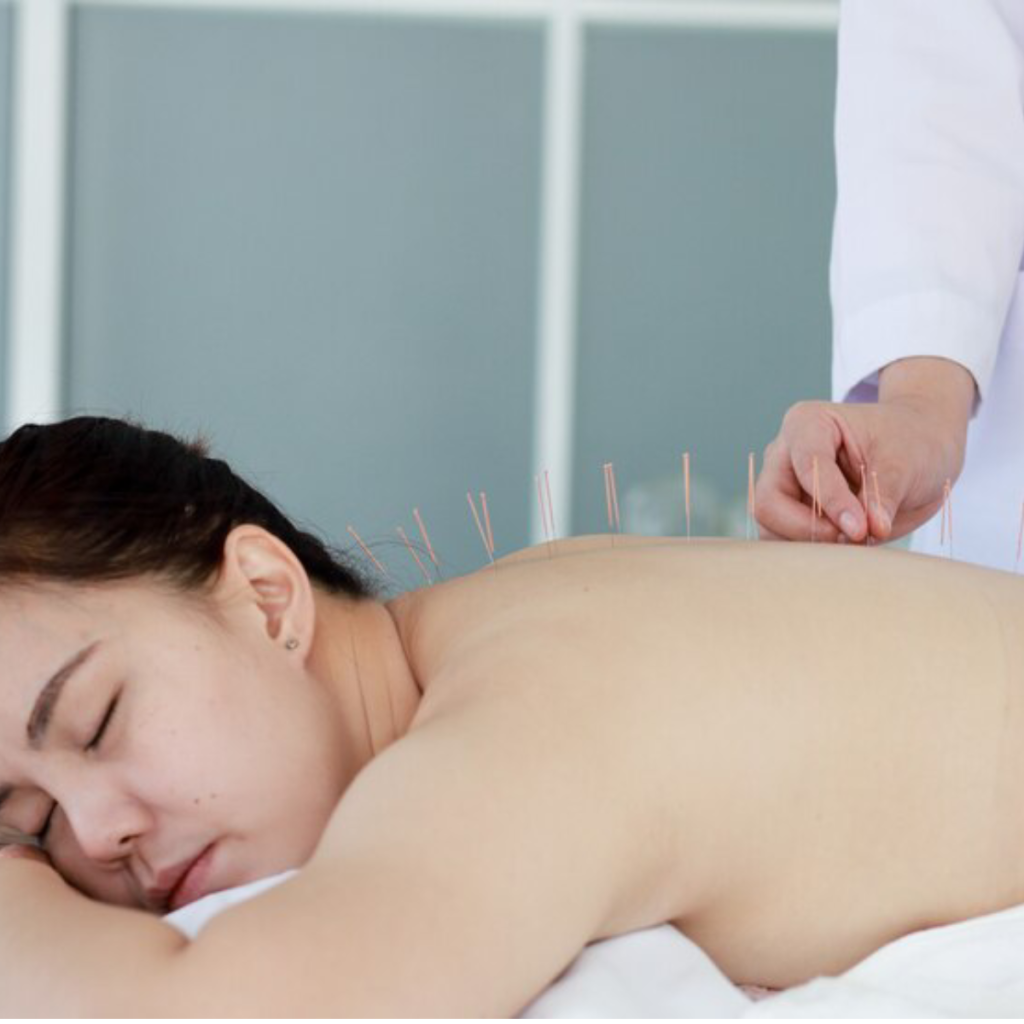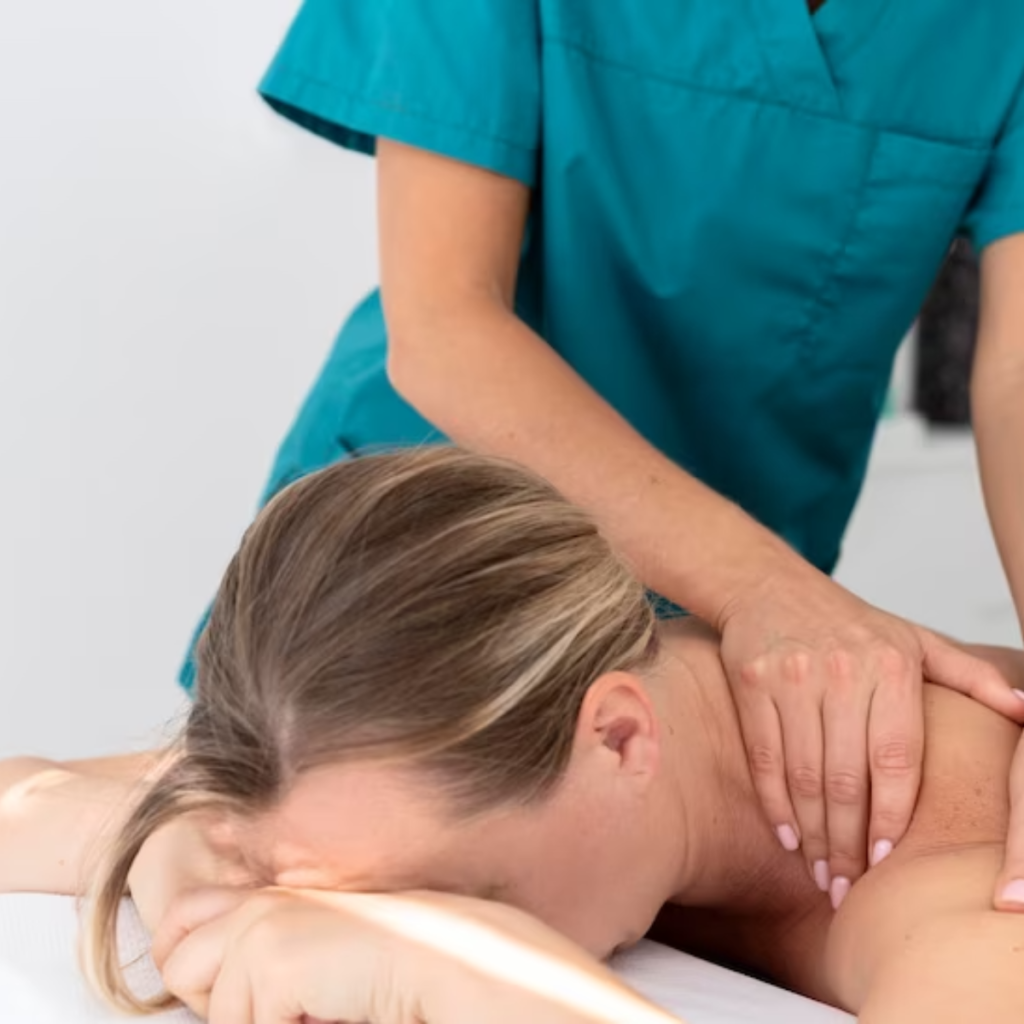Discover how massage and acupuncture can offer effective relief from postpartum back pain.
Can Massage and Acupuncture Provide Relief from Postpartum Back Pain?
Being a new parent is both joyful and challenging. Amidst the countless diaper changes and sleepless nights, postpartum back pain can become an unwelcome companion. But fear not! There are natural remedies that may bring you the relief you seek. In this article, we will explore the world of massage and acupuncture as potential therapies for postpartum back pain. So, put on your comfy slippers, grab a cup of tea, and join us on this journey to a pain-free back!

Understanding Postpartum Back Pain
Before we dive into the world of massage and acupuncture, let’s first understand what postpartum back pain is all about. After childbirth, a woman’s body goes through numerous changes. Hormones fluctuate, ligaments stretch, and muscles strain. All these transformations can lead to discomfort and, unfortunately, back pain.
During pregnancy, the body undergoes significant changes to accommodate the growing baby. The weight gain during this period can put a strain on the back muscles, leading to postpartum back pain. The extra weight from the adorable baby bump, while a beautiful reminder of the miracle of life, can cause discomfort and soreness in the lower back.
In addition to the physical strain, hormonal changes also play a role in postpartum back pain. During pregnancy, the body produces hormones that help relax the ligaments in the pelvis to prepare for childbirth. However, these hormonal changes can also affect the elasticity of ligaments throughout the body, making them more prone to injury and contributing to back pain.
Causes of Postpartum Back Pain
There are several factors that contribute to postpartum back pain. One of the primary culprits is the extra weight gained during pregnancy. Those adorable baby bumps may look cute, but they can put a strain on your back muscles. Additionally, the hormonal changes that occur during pregnancy can affect the elasticity of your ligaments, making them more prone to injury.
Another common cause of postpartum back pain is the strain placed on the muscles and ligaments during labor and delivery. The process of giving birth can be physically demanding, and the muscles and ligaments in the back can become strained or even injured during this time. This can lead to ongoing pain and discomfort in the postpartum period.
Furthermore, the changes in posture that occur during pregnancy can also contribute to postpartum back pain. As the baby grows, the center of gravity shifts, causing the body to adjust its posture to maintain balance. This change in posture can put additional stress on the back muscles, leading to pain and discomfort.
Common Symptoms and Duration
Postpartum back pain can manifest in various ways. Some women experience a dull ache, while others feel sharp, shooting pains. It can radiate from the lower back to the hips and even down the legs. As for how long it lasts, the duration can vary from person to person. For some fortunate souls, the pain may disappear on its own within a few weeks. Others may have to endure it for several months.
In addition to the physical symptoms, postpartum back pain can also have an emotional impact on new mothers. Dealing with the challenges of caring for a newborn while experiencing pain can be overwhelming and exhausting. It is important for new mothers to seek support and find ways to manage their pain effectively.
It is worth noting that postpartum back pain is a common condition and is often temporary. However, it is essential to consult with a healthcare professional to ensure proper diagnosis and treatment. They can provide guidance on pain management techniques, exercises, and other therapies that can help alleviate discomfort and promote healing.
The Role of Massage in Pain Relief
Now that we have a better understanding of postpartum back pain, let’s explore how massage can come to the rescue! Massage has been used for centuries to soothe aching muscles and promote relaxation. When it comes to postpartum back pain, it can work wonders.
Postpartum back pain is a common issue that many new mothers experience. The physical strain of pregnancy and childbirth can take a toll on the body, particularly the back muscles. These muscles may become tense and sore, causing discomfort and pain. Massage therapy offers a natural and effective solution for relieving this pain.
Different Types of Massages for Back Pain
There are various massage techniques that can address postpartum back pain. From Swedish massage to deep tissue massage, each type brings its unique benefits. Some focus on gentle strokes to increase blood flow, while others target deeper tissue layers to release tension. The choice depends on your personal preference and comfort level.
Swedish massage is a popular choice for postpartum back pain relief. It involves long, flowing strokes that help to relax the muscles and improve circulation. This type of massage can be particularly soothing for new mothers who are experiencing muscle tightness and discomfort.
Deep tissue massage, on the other hand, is a more intense form of massage that targets the deeper layers of muscle and connective tissue. It can be beneficial for relieving chronic muscle tension and breaking up knots in the back. However, it may not be suitable for everyone, especially those with sensitive or injured muscles.
How Massage Therapy Works for Pain Relief
Massage therapy not only feels great but also stimulates the release of endorphins, the body’s natural painkillers. It can increase circulation, reduce inflammation, and promote muscle relaxation. By targeting specific pressure points and kneading away tension, massage can provide relief from postpartum back pain.
During a massage session, the therapist will use various techniques to address the specific needs of the individual. They may apply gentle pressure to certain areas to release tension and promote relaxation. They may also use kneading and stretching techniques to improve flexibility and relieve muscle tightness.
In addition to the physical benefits, massage therapy can also have a positive impact on mental well-being. The soothing touch and calming environment of a massage session can help reduce stress and anxiety, which can often contribute to pain and discomfort.
It’s important to note that while massage therapy can be highly effective for relieving postpartum back pain, it is not a substitute for medical treatment. If you are experiencing severe or persistent pain, it is always recommended to consult with a healthcare professional.

Acupuncture as a Pain Relief Method
Now that we’ve rubbed our way through massage therapy, let’s explore the ancient art of acupuncture. This alternative form of medicine has gained popularity in recent years, thanks to its potential to relieve various ailments, including back pain.
Acupuncture has been practiced for thousands of years in traditional Chinese medicine. It is based on the principle that energy flows through channels in our body called meridians. These meridians are like rivers, carrying vital energy, or qi, to different parts of the body. When these pathways become blocked or out of balance, it can result in pain and discomfort.
The practice of acupuncture aims to restore the body’s natural balance by inserting thin needles into specific points along these meridians. These points are carefully chosen based on the individual’s symptoms and the underlying cause of the pain. By stimulating these points, acupuncture can help remove blockages, improve the flow of qi, and promote healing.
The Science Behind Acupuncture
While the concept of qi and meridians may seem mystical, modern research has shed light on the scientific mechanisms behind acupuncture. Studies have shown that acupuncture can stimulate the release of endorphins, which are natural painkillers produced by the body. It also activates the body’s opioid system, which further enhances pain relief.
Additionally, acupuncture has been found to have anti-inflammatory effects. It can reduce the production of pro-inflammatory molecules and increase the release of anti-inflammatory substances, helping to reduce swelling and inflammation in the affected area.
Furthermore, acupuncture has been shown to have a modulating effect on the nervous system. It can stimulate the release of neurotransmitters, such as serotonin and dopamine, which play a role in pain perception and mood regulation. This may explain why acupuncture not only provides pain relief but also improves overall well-being.
Acupuncture Points for Back Pain
When it comes to back pain, acupuncturists focus on specific points that correlate with the affected area. For postpartum back pain, they may target points along the bladder meridian, which runs along the back. By stimulating these points, acupuncture can help alleviate pain and promote healing.
In addition to the bladder meridian, other acupuncture points commonly used for back pain include the governing vessel meridian, which runs along the spine, and the gallbladder meridian, which runs along the sides of the body. These points are believed to have a direct influence on the muscles, nerves, and joints in the back, helping to relieve tension, reduce inflammation, and improve circulation in the area.
It’s important to note that acupuncture is not a one-size-fits-all approach. Each individual’s condition is unique, and a skilled acupuncturist will tailor the treatment to address the specific underlying causes of the back pain. They may also combine acupuncture with other techniques, such as cupping or herbal medicine, to enhance the therapeutic effects.
Overall, acupuncture offers a holistic approach to pain relief, addressing not only the physical symptoms but also the underlying imbalances in the body. Its long history of use and growing body of scientific evidence make it a promising option for those seeking natural and effective relief from back pain.
Comparing Massage and Acupuncture
Now that we’ve explored the benefits of both massage and acupuncture, you may be wondering which one to choose. Let’s put them head-to-head and see how they measure up!
Effectiveness of Massage vs Acupuncture
Both massage and acupuncture have shown promising results in relieving postpartum back pain. Studies have indicated that massage can reduce pain intensity and improve mobility, while acupuncture has demonstrated its potential to relieve chronic pain. However, it ultimately comes down to personal preference and what works best for you.
Safety and Risks of Both Methods
When it comes to safety, both massage and acupuncture are generally considered low-risk therapies. However, it’s essential to consult with a qualified practitioner to ensure that you receive proper care. Massage may not be suitable for certain medical conditions, such as blood clotting disorders, while acupuncture requires sterile needle techniques to minimize the risk of infection.
Integrating Massage and Acupuncture into Postpartum Care
Now that you’re armed with knowledge about massage and acupuncture, you may be excited to incorporate these therapies into your postpartum care routine. But when is the right time to start, and how do you find a qualified practitioner?
When to Start These Therapies
Every woman’s postpartum journey is unique, so there’s no one-size-fits-all answer. Some may find relief right away and can begin these therapies shortly after giving birth. Others may need to wait a few weeks or even a couple of months until their body has healed adequately. Listen to your body and consult with your healthcare provider to determine the best time for you.
Finding a Qualified Practitioner
When it comes to massage and acupuncture, finding the right practitioner is key. Look for professionals who are experienced in working with postpartum women. Seek recommendations from friends, family, or your healthcare provider. Don’t be afraid to ask questions about their training and certifications to ensure you’re in good hands.
So, dear new parent, take heart! There is hope for postpartum back pain relief. Massage and acupuncture offer natural alternatives that can work wonders for your aching back. Whether it’s the soothing touch of massage or the delicate balance of acupuncture, these therapies may provide the relief you seek. Remember, each person’s journey is unique, so be patient with yourself and trust the process. Here’s to a pain-free back and a blissful postpartum experience!



